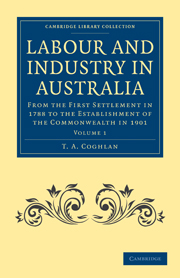 Labour and Industry in Australia
Labour and Industry in Australia Book contents
- Frontmatter
- PREFACE
- Contents
- PART I FROM THE FOUNDATION OF SETTLEMENT TO THE CROSSING OF THE MOUNTAINS
- PART II FROM THE CROSSING OF THE MOUNTAINS TO THE ABOLITION OF THE ASSIGNMENT SYSTEM
- PART III FROM THE ABOLITION OF THE ASSIGNMENT SYSTEM TO THE DISCOVERY OF GOLD
- I INTRODUCTION TO THE THIRD PERIOD
- II TRANSPORTATION
- III IMMIGRATION
- IV LAND LEGISLATION IN NEW SOUTH WALES, VAN DIEMEN'S LAND, AND WESTERN AUSTRALIA
- V LAND LEGISLATION AND SETTLEMENT IN SOUTH AUSTRALIA AND THE WAKEFIELD THEORY OF COLONIZATION
- VI LABOUR AND WAGES
- VII PRICES
- VIII FINANCIAL CRISIS OF 1841, 1842, AND 1843
- IX INDUSTRIES
- PART IV FROM THE DISCOVERY OF GOLD TO THE INTRODUCTION OF FREE SELECTION OF LAND BEFORE SURVEY
- Frontmatter
- PREFACE
- Contents
- PART I FROM THE FOUNDATION OF SETTLEMENT TO THE CROSSING OF THE MOUNTAINS
- PART II FROM THE CROSSING OF THE MOUNTAINS TO THE ABOLITION OF THE ASSIGNMENT SYSTEM
- PART III FROM THE ABOLITION OF THE ASSIGNMENT SYSTEM TO THE DISCOVERY OF GOLD
- I INTRODUCTION TO THE THIRD PERIOD
- II TRANSPORTATION
- III IMMIGRATION
- IV LAND LEGISLATION IN NEW SOUTH WALES, VAN DIEMEN'S LAND, AND WESTERN AUSTRALIA
- V LAND LEGISLATION AND SETTLEMENT IN SOUTH AUSTRALIA AND THE WAKEFIELD THEORY OF COLONIZATION
- VI LABOUR AND WAGES
- VII PRICES
- VIII FINANCIAL CRISIS OF 1841, 1842, AND 1843
- IX INDUSTRIES
- PART IV FROM THE DISCOVERY OF GOLD TO THE INTRODUCTION OF FREE SELECTION OF LAND BEFORE SURVEY
Summary
When assignment was abolished in 1839 there were 25,322 convicts in assigned service in New South Wales, and these were reduced by the expiry of sentences at the rate of about 5000 a year. In 1843 there remained only 3532 convicts in assignment, and these became free during the next five years, so that in 1848 there were no convicts in private employ. As it had been customary during the later years of transportation to assign convicts only to employers in the country districts, the pastoral industry was the first to feel the stoppage. It is true that when their period of assignment was over, a large proportion of the ex-convicts remained in the districts where they had been employed, and continued in their old occupations, but many did not, and on obtaining their freedom made straightway for the towns. The cessation of assignment therefore produced a marked reduction in the number of persons of the convict or cheap labour class available for rural industries, and it was not found easy to replace them by free immigrants, especially in the more remote districts.
Speaking generally, the labour of assigned convicts was not efficient, though it was comparatively more efficient in the pastoral industry than in any other, but it was cheap.
- Type
- Chapter
- Information
- Labour and Industry in AustraliaFrom the First Settlement in 1788 to the Establishment of the Commonwealth in 1901, pp. 424 - 459Publisher: Cambridge University PressPrint publication year: 2011First published in: 1918


